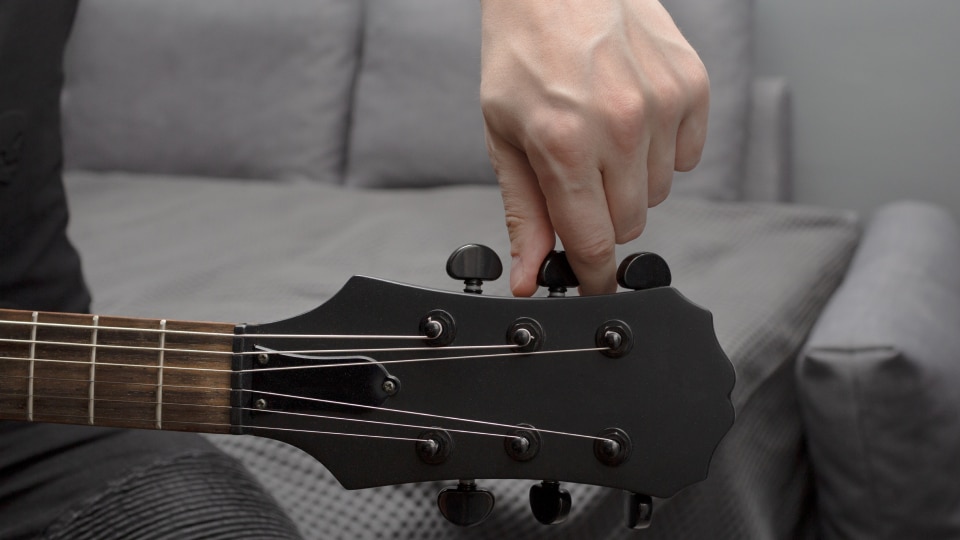C Standard tuning is a fascinating alternative tuning that can add a unique flavor to your guitar playing. Popular in genres such as metal, rock, and blues, this guitar tuning offers a deeper and more resonant sound compared to the traditional E Standard tuning.
By lowering all six strings down two whole steps, you'll unlock a world of new possibilities and rich tonalities that can elevate your music to new heights.
In this article, we'll guide you through the process of tuning your guitar to C Standard, provide helpful tips and techniques to make the most out of this different tuning and explore some popular songs and artists who have embraced it in their music.
How To Tune Your Guitar to C Standard: Step-by-Step Guide
Whether you're a beginner or an experienced guitarist, tuning your electric or acoustic guitar to C Standard can be a breeze with this step-by-step guide. Remember, the Rocksmith Tuner app can assist you in tuning your guitar accurately.
1. Start With the 6th String (Low C)
The 6th string, or the lowest string on your guitar, should be tuned to a low C. This is two whole steps down from the standard low E string.
Using a tuner, pluck the 6th string and use your tuner to guide you in adjusting the tuning peg until the tuner indicates a C note.
2. Tune the 5th String (F)
The 5th string should be tuned down two whole steps from the standard A to F.
Using a tuner, pluck the 5th string and adjust the tuning peg until the tuner indicates an F note.
3. Tune the 4th String (Bb)
The 4th string should be tuned down two whole steps from the standard D to Bb, also known as A#.
Using a tuner, pluck the 4th string and adjust the tuning peg until the tuner indicates a Bb note.
4. Tune the 3rd String (Eb)
The 3rd string, or G string, should be tuned down two whole steps from the standard G to Eb.
Using a tuner, pluck the 3rd string and adjust the tuning peg until the tuner indicates an Eb note, also known as D#.
5. Tune the 2nd String (G)
The 2nd string should be tuned down two whole steps from the standard B to G.
Using a tuner, pluck the 2nd string and adjust the tuning peg until the tuner indicates an A# note.
6. Tune the 1st String (C)
The 1st string, or the highest string on your guitar, should be tuned down two whole steps from the standard E to C.
Using a tuner, pluck the 1st string and adjust the tuning peg until the tuner indicates a C note.
Tuning With Rocksmith Tuner
![[RS+] Tuning With Rocksmith Tuner](http://staticctf.ubisoft.com/J3yJr34U2pZ2Ieem48Dwy9uqj5PNUQTn/2YA6TevPvU3uvkm9zR2fQv/8267429f52c0946176da4a2a6ca93557/image_123986672-_4_.jpg)
When using the Rocksmith Tuner mobile app on any Apple or Android devices, you can quickly and easily tune your acoustic or electric guitar to any standard or alternative tuning --- like D Standard, Drop B, Drop C, and more. The world is your oyster.
To tune your guitar to C Standard, open the app and select the "E Standard" box below the guitar. This will open up a large list of potential tuning options. Scroll down until you see the option for "C Standard CFA#D#GC."
Once you've selected the tuning you want, place your phone in front of your guitar or amp and begin plucking each string. To hear a specific note, click the tuning peg you would like to hear.
This tuner is quick, easy to use, and totally customizable, with options to change the guitar head shape to match your guitar, switch to bass guitar options, or even tune chromatically for endless options.
What Are Some Tips and Techniques for Playing in C Standard?
![[RS+] What Are Some Tips and Techniques for Playing in C Standard](http://staticctf.ubisoft.com/J3yJr34U2pZ2Ieem48Dwy9uqj5PNUQTn/VJu9w84kpMiPNgWjXnLXP/c70baf0db5bf84e8c7f207bc760afdf1/AdobeStock_163114935.jpg)
C Standard tuning offers a unique playing experience with its lower pitch and deeper tones. To make the most of this tuning and enhance your guitar playing, here are some helpful tips and techniques to keep in mind:
Adjust Your Guitar Setup
When switching to C Standard tuning, you might notice increased string tension and fret buzz. To minimize these issues, consider adjusting your guitar's action, intonation, and truss rod. This will ensure optimal playability and help maintain the instrument's overall health.
Experiment With Heavier Strings
Thicker strings can help maintain tension and improve tone when tuning down to C Standard. Heavier gauge strings will provide a more solid feel and reduce unwanted vibrations or buzzing.
Explore New Chord Shapes and Fingerings
While many familiar chord shapes still apply in C Standard tuning, take the opportunity to experiment with new fingerings and inversions. This can lead to unique and inspiring chord voicings that might not have been possible in standard tuning.
Practice Muting Techniques
The lower pitch and increased string tension in C Standard tuning can make unwanted string noise more apparent. Focus on refining your picking and fretting hand muting techniques to keep your playing clean and tight.
Develop Your Alternate Picking Skills
The heavier sound and lower pitch of C Standard tuning lend themselves well to fast, aggressive playing styles. Work on your alternate picking technique to improve speed and accuracy when playing riffs and solos.
Embrace the Tuning's Versatility
Don't limit yourself to just one genre or style. C Standard tuning is used in various genres, from metal to blues and even jazz. Experiment with different techniques and styles to truly unlock the potential of this versatile tuning.
The more you practice, play, and have fun with C Standard tuning, the more fluid and second nature these techniques become.
Exploring Music in C Standard Tuning
![[RS+] Exploring Music in C Standard Tuning](http://staticctf.ubisoft.com/J3yJr34U2pZ2Ieem48Dwy9uqj5PNUQTn/3KGFfTmjvcBEENdE0xEPfO/68d340bd058c7104a8dfbcd37321ebad/AdobeStock_187878950.jpg)
Now that you've successfully tuned your guitar to C Standard, it's time to dive into the world of music that utilizes this unique tuning. The lower pitches and heavier sound make it a popular choice among metal, doom, and sludge bands.
C Standard tuning provides a fresh perspective on the guitar, allowing you to experiment with different chord shapes and scales while still maintaining a familiar fingerboard layout.
C standard can be a great way for newer players to build up their confidence in different tunings and explore new musical ideas.
The Rocksmith+ library offers a diverse collection of songs that cater to a wide range of musical tastes and genres. By filtering the library by tuning, you can quickly discover tracks that use C Standard tuning. This will not only provide you with a chance to practice your newfound tuning skills, but also help you to expand your musical horizons.
Some notable songs available in the Rocksmith+ library that use C Standard tuning include:
- Droid by Candlemass - 2008
- My Twin by Katatonia - 2006
- The Oath by Arch Enemy - 2007
- To Ride, Shoot Straight and Speak the Truth by Entombed - 2007
...and many more.
Remember, practice makes perfect, so don't hesitate to take your time and work through these songs at your own pace. With Rocksmith+, you have access to a wide range of tools and resources designed to make learning guitar enjoyable and effective, regardless of your skill level.
Getting Started With C Standard
C Standard tuning is an exciting way to explore new musical possibilities and push the boundaries of your guitar playing. By embracing this alternative tuning, you'll be well on your way to becoming a more versatile and confident musician.
Now that you've successfully tuned your guitar to C Standard, you can explore a wide range of songs that utilize this tuning. Rocksmith+ offers an extensive library of over 7,000 songs, many of which can be played in C Standard tuning.
Sources:
Longitudinal Waves and Guitar Strings | Physics Classroom
American roots music | World Music Central
3. accidentals, half and whole steps | Western Kentucky University



